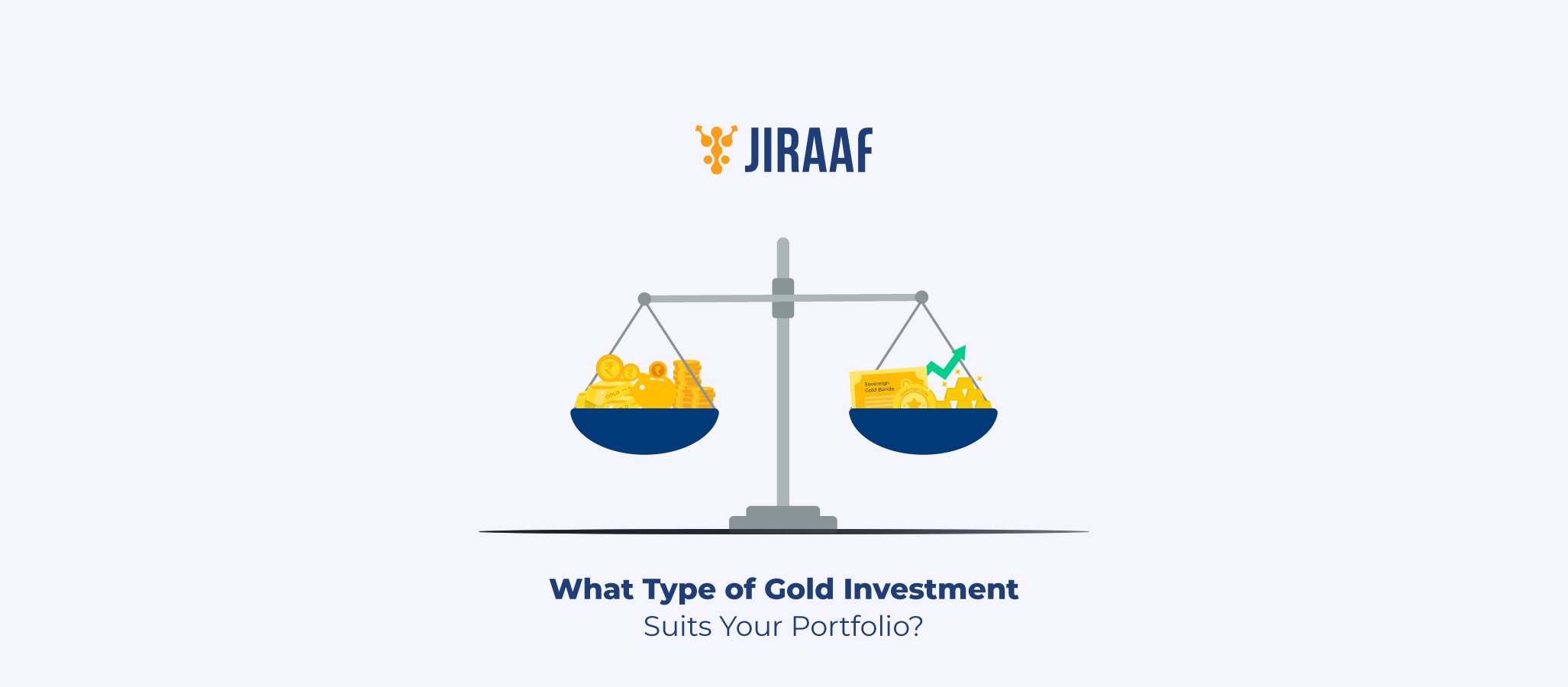Gold is a favoured investment in India due to its appreciating value, stability and associated sentiments. For retail investors, choosing between sovereign gold bonds (SGBs) and physical gold is often a matter of choosing between the heart and the mind. This guide is meant to overcome your dilemmas, understand both options and make an informed decision based on your financial goals.
What is Sovereign Gold Bond?
Sovereign gold bonds (SGBs) are government securities issued by the Reserve Bank of India on behalf of the Government of India. Denominated in grams of gold with a minimum investment of 1 gram, SGBs have an 8-year tenure and paying a fixed interest rate of 2.50% per annum on the nominal value, in addition to the potential capital appreciation tied to gold prices. Investors can buy up to 4 kg per fiscal year (20 kg for trusts), with bonds available in both dematerialized and paper forms.
SGBs offer early redemption after 5 years, can be traded on stock exchanges, and used as collateral for loans. While interest is taxable, capital gains at maturity are tax-exempt for individual investors, making SGBs an attractive option for those seeking the benefits of gold investment without the risks and costs associated with physical gold ownership.
What is Physical Gold Investment?
Physical gold investment refers to owning of tangible gold assets such as coins, bars, and/or jewellery and is often a result of an emotional decision. Unlike gold ETFs or SGBs, which are paper-based assets, physical gold is something you can hold and store. While it offers a sense of security and value retention, investors should consider the associated storage and security costs.
Why should we look beyond Physical Gold?
- Increased Transaction Costs: Purchasing physical gold often comes with an additional expense, such as making charges imposed by jewellers and GST, which inflate the overall cost. If held for a short term, this can turn into a loss-making affair. Additionally, when selling the gold, further costs like dealer commissions reduce the overall return on investment.
- Storage costs and security concerns: Renting a safe locker to store gold can be an expensive affair and if stored at home it comes with the risk of being lost or stolen.
- Returns Only Upon Sale: With physical gold, you can only realise returns when you decide to sell it. In contrast, sovereign gold bonds (SGBs) offer regular fixed interest payments and automatically mature after 8 years, providing a steady income stream in addition to potential gold price appreciation.
Benefits of Investing in Sovereign Gold Bonds (SGBs)
Digital Gold Ownership
Sovereign gold bonds (SGBs) offer a paperless and convenient way to invest in gold without the need for a physical storage. As a digital alternative, SGBs provide exposure to gold price movements while simplifying the logistics of ownership, making them an appealing option for today’s investors.
Environment-friendly Investment Option
SGBs also present a more environment-friendly investment choice. Unlike traditional gold mining, which can have negative environmental consequences, SGBs allow you to invest in gold without directly contributing to those impacts.
Potential for Higher Returns
One distinct advantage of SGBs is the additional 2.5% annual interest they offer on top of gold price appreciation. This means that even when gold prices remain stable, you still earn a return providing a performance edge over other gold investments.
Integration with Financial Planning
The 8-year tenure of SGBs aligns well with long-term financial planning. Whether you’re saving for a major life event, such as your child’s education or your own retirement, SGBs can serve as a reliable gold-linked component in a diversified portfolio.
Paperless Wealth Transfer
Another advantage of SGBs is the ease of wealth transfer in their dematerialized form. Unlike physical gold, which may involve complicated procedures for inheritance, transferring SGBs to heirs is a straightforward process, reducing the administrative burden during estate planning.
Disadvantages of Sovereign Gold Bond Investments:
Long Maturity Period
SGBs have a maturity period of 8 years, which may deter some investors looking for shorter investment horizons. The options to redeem starts only after five years, thus the long lock-in can be unattractive for those seeking liquidity.
Limited Liquidity
While SGBs can be traded on stock exchanges, the secondary market liquidity is often low. This can make it difficult for investors to sell their bonds quickly or at favourable prices.
Investment Availability
SGBs are issued in tranches and are not available for purchase at any time. Investors must wait for the RBI to announce new issuances, which can limit investment opportunities.
Tax Implications
While there are tax benefits (such as no levying of capital gains tax if held until maturity), the interest earned on SGBs is fully taxable according to the investor’s income tax slab.
SGBs vs Physical Gold: Key Features and Benefits
| Aspect | Sovereign Gold Bonds (SGBs) | Physical Gold | Explanation |
| Form | Electronic | Physical (coins, bars, jewellery) | SGBs are stored electronically in demat accounts, while physical gold is tangible and can be held. |
| Purity | 99.90% | Varies (24K, 22K, 18K, etc.) | SGBs typically guarantee 99.9% purity, whereas physical gold’s purity can vary depending on the form and source. |
| Storage | Digital, no physical storage needed | Requires secure storage (safe, bank locker) | SGBs eliminate storage concerns, while physical gold needs secure storage to prevent theft or loss. |
| Liquidity | Less liquid, can be traded on exchanges | Highly liquid, can be sold easily | Physical gold is generally more liquid, as it can be sold quickly to jewellers or dealers. SGBs can be traded but may have lower liquidity. |
| Returns | Interest of 2.5% p.a. + Capital appreciation | Only capital appreciation | SGBs offer additional returns through interest, while physical gold only benefits from price appreciation. |
| Tax Benefits | Interest is taxable, long-term capital gains tax exempt after 8 years | Long-term capital gains tax applicable after 3 years | SGBs offer better tax benefits, especially for long-term holders, compared to physical gold. |
| Safety | Backed by the government, no risk of theft | Risk of theft or loss | SGBs are safer as they’re government-backed and can’t be physically stolen, unlike physical gold. |
| Making Charges | No making charges | Applicable on jewellery, can be 5-20% of gold value | SGBs don’t incur making charges, which can significantly add to the cost of gold jewellery. |
| Redemption | Can be redeemed at maturity (8 years) or prematurely after 5 years | Can be sold anytime | Physical gold offers more flexibility in selling, while SGBs have specific redemption periods. |
| Use as Collateral | Can be used as collateral for loans | Widely accepted as collateral for loans | Both forms can be used as collateral, but physical gold is more widely accepted by lenders. |
Sovereign Gold Bond vs Physical Gold: The Paramount Query is Which One to Pick?
It purely depends on your investment goals, asset allocation, risk appetite, liquidation priorities, and current life stage. For example, if you are looking forward to getting your children married soon, physical gold in the form of jewellery could make more sense for you as gifts when compared to gold bonds.
If you are one who is investing in gold for a long-term horizon and looking for a low-cost government-backed investment option, SGBs is a great option to earn secure returns.
Where to Buy Sovereign Gold Bonds from?
It is not complicated to buy SGBs. You can purchase them through online bond platforms, banks, or brokerage houses.
Discover fixed income investments with Jiraaf, a SEBI registered online bonds platform that educates and brings access to a wide array of bonds. Sign up today to explore diversified fixed income investment opportunities to support your goal-based wealth creation journey. Start investing!




